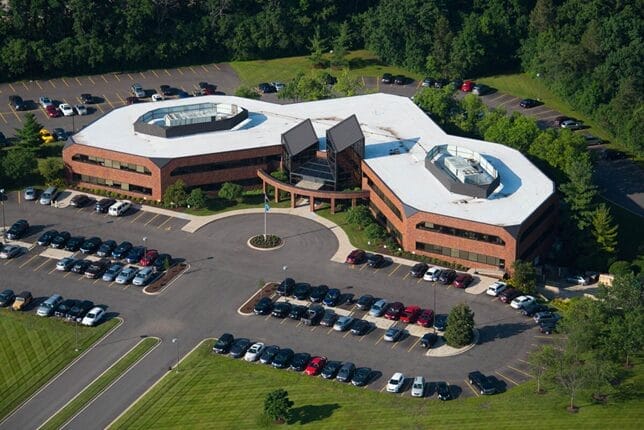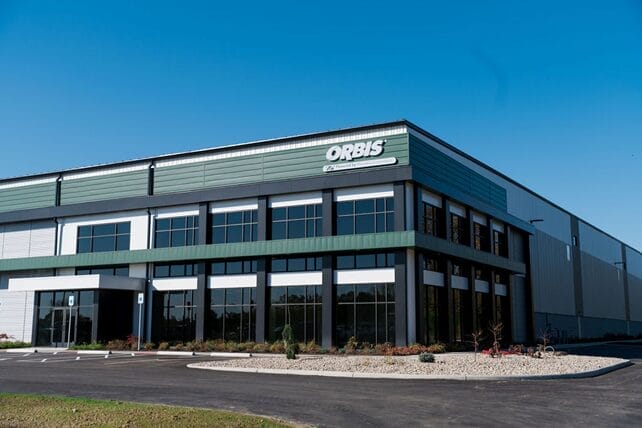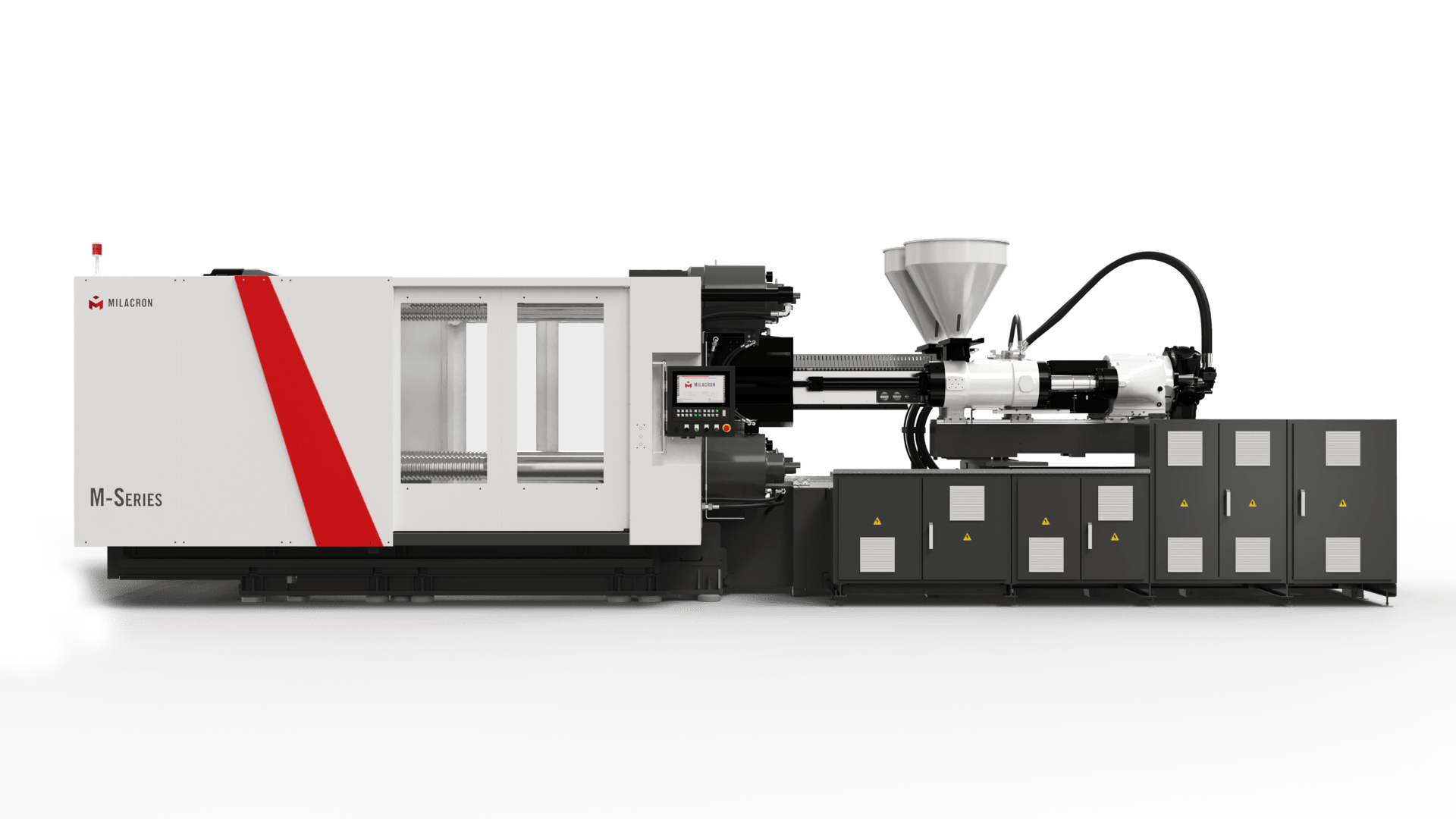A collaboration in large-part plastics sustainability through structural foam molding innovation
For nearly three decades, ORBIS Corporation has turned to Milacron’s industry-leading low-pressure injection molding (LPIM) capabilities to meet its customers’ plastics processing goals, and for good reason – Milacron has more than 50 years in the LPIM business.
Today, the Milacron L-Series platform of machines comprises one-third of ORBIS’s fleet of IMMs with units deployed at five North American facilities – a collaboration that benefits ORBIS through lightweighting, reduced scrap, the ability to utilize up to 100% regrind flake material during production, and increased machine efficiency.
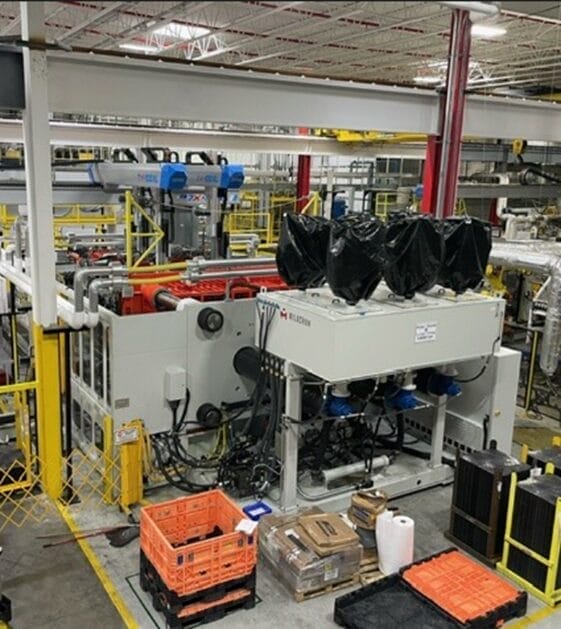
large-part plastic bins at the ORBIS Bardstown, KY facility.
Conversely, Milacron has relied on ORBIS to trial various innovations in plastics and conduct machine retrofits throughout the nearly three decades the two have been in collaboration. In addition, ORBIS became a beta site for the Cincinnati-based OEM’s IIoT remote monitoring solution that’s now integrated into every new Milacron injection molding machine installed for plastics processors across the U.S. and Europe.
“Milacron continuously provides us with better technologies, which allow us to continue to improve our efficiencies,” said Lynn Hediger, Vice President of Product Management for ORBIS. “Essentially, we can get more pieces out the door per hour, thanks to Milacron’s L-Series LPIM technology.”
ORBIS has been in plastics for nearly 70 years and is an industry leader in injection-molded reusable packaging. Today, their products are used in a wide variety of industries, including automotive, grocery, pharmaceutical, e-commerce, automated warehouses, and many others. Designed for long service life, their reusable packaging products replace single-use boxes and wooden pallets and can be recycled at the end of their life.
According to the ORBIS website (orbiscorporation.com), the company’s goal is to collaborate and facilitate a more sustainable way for its customers to move and protect goods in the supply chain. “We analyze your business to design and execute an integrated reusable packaging program that increases your efficiency while reducing your environmental impact.”
Milacron’s LPIM structural foam technology is ideal for molding ultra-large and thicker plastic parts – this combination of a solid surface over a cellular-foamed core results in a high strength-to-weight ratio. Through this lightweight technology, the Milacron L-Series LPIM platform provides partners like ORBIS the capability of producing large-part plastics with thicker wall sections and detailed part designs at a lower material weight.
“With Milacron’s LPIM machine platform, ORBIS is positioned to support sustainability initiatives driven by customers due to our continuous improvement mindset and eagerness to make more sustainable and efficient products,” said Hediger. “Not only can we achieve higher recycled material content in our products, but we also leverage opportunities to lightweight and improve packaging efficiency for our customers’ transportation loops,” he said.
The evolution of a sustainable collaboration
ORBIS bought its first LPIM machine from a Milacron-acquired OEM in the mid-nineties. Improved efficiency was a primary goal back then and seeing as though Milacron had been at the forefront of LPIM advancements since the 1970s, it was an advantageous fit. Since that time, corporations have begun integrating sustainability efforts into their Corporate Social Responsibility models, including ORBIS customers.
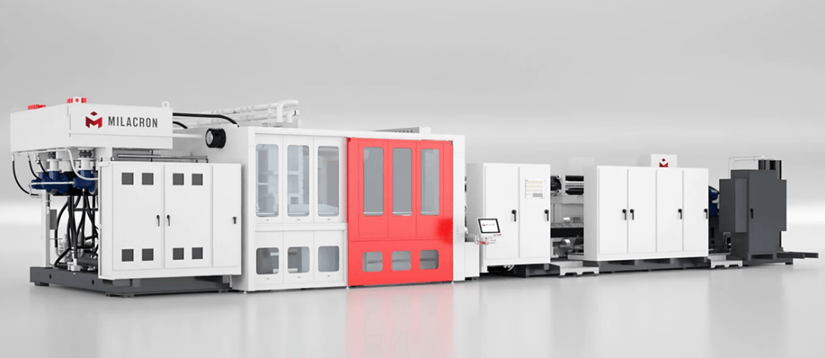
“Operationally, Milacron has helped ORBIS reduce scrap, avoid the need for re-compounding recycled materials, and increase our press uptime,” said Nathan Marret, Senior Director of Molding Operations for ORBIS. “This has delivered us an advantageous market position that supports our ongoing commitment to efficiency, sustainability, and quality for our customers.”
The scrap material produced by ORBIS, along with end-of-life products purchased back from customers, is reground and fed right back into the Milacron machines, instead of having to first put it through the compounding process. This results in energy savings which additionally benefits ORBIS customers.
“Our reusables are designed for long service life and are intended to replace single-use boxes and wooden pallets in the supply chain,” said Hediger. “By design, reusable totes, pallets, dunnage, metal racks, and bulk systems are used repeatedly during their service life. And, at the end of their life, they can be recovered, recycled, and reprocessed into new packaging products without entering the solid waste stream.”
Over the last three years, Marret says ORBIS has particularly relied on Milacron’s advanced LPIM technology for its automotive industry customers, whose stakeholders tend to hold them to higher standards. He says the EcoVadis sustainability rating platform is now an elevated priority for many ORBIS customers.
“Our automotive customers want to ensure their stakeholders see the ‘real sustainability’ efforts being made,” explained Marret. “The EcoVadis score is what they use to report out on sustainability, so in turn, they are asking their suppliers to use this too.”
EcoVadis rates businesses’ sustainability based on environmental impact, labor, ethics, and procurement practices. According to its website, EcoVadis serves to help companies manage environmental risk and improve sustainability across their supply chains, as well as comply with global regulations.
Part of the data that feeds an EcoVadis score on environmental impact in the plastics industry is the amount of regrind material utilized in part production, as well as overall energy reduction, both of which Milacron LPIM technology affords ORBIS for their customers, according to Marret.
He estimates other large industry sectors within the ORBIS customer base will also soon utilize the EcoVadis sustainability scorecard – and, when they do, ORBIS is ready and willing to support all its customers to ensure sustainability requirements are met accordingly.
“All of the steps we are taking in our sustainability measures within our packaging are in line with EcoVadis,” he said.
ORBIS utilized as a beta for Milacron IIoT solution
ORBIS may consider the effective and efficient production of reusables for its customers its principal priority, but the overall performance of its fleet, or OEE, is also critical – downtime is costly in this industry.
ORBIS first became a beta site for Milacron’s remote IIoT solution, M-Powered, on its high-pressure injection molding machines back in 2016 to monitor its machines and their related processes. Since then, Milacron has helped ORBIS build baseline predictive analytics that the company uses to plan repairs and maintenance, as well as to troubleshoot.
M-Powered turns Milacron machine data into valuable insights that provide ORBIS with unique machine intelligence. These real-time files are collected, combined, and analyzed to help the ORBIS team prevent or reduce inefficiencies.
“Milacron’s M-Powered has provided us the insight to take machines down mindfully for proactive part replacement versus waiting for a catastrophic failure to occur,” said Hediger.
ORBIS integrated M-Powered into its Milacron L-Series machine platform earlier this year. The processor appreciates M-Powered’s ability to improve its machine reliability and press uptime, but most notably its efficiency in predicting failures in advance.
Through this digital monitoring solution, the ORBIS team can tap into Milacron Engineering talent, as well as remote troubleshoot without having to wait for a technician, which equates to machine uptime.
“This is where M-Powered benefits us most,” said Marret. “We oftentimes only have to wait a matter of hours to get problems identified, versus days.”
Milacron customers see sustainability increase through trackable scrap reduction, better energy efficiency performance, and reduced overall risk on their machines.* It’s considered such an advantageous value proposition for customers that Milacron now integrates M-Powered onto all its new machines in the U.S. and Europe for free for the first 12 months of ownership.
A collaborative effort that drives efficiencies
As ORBIS awaits delivery of its latest Milacron LPIM machine that will operate out of the corporation’s Bardstown, Kentucky facility, orders continue to roll in from their customers. The company looks forward to continued growth with Milacron.
“ORBIS and Milacron have a strong bond in our similar vision,” he said. “We look at this as a long-term partnership – not just transactional.”
Additionally, Hediger said there is growth potential for ORBIS through the management of packaging for their customers. Essentially, the greatest sectors for growth will come from ORBIS customers who re-utilize packaging to its fullest potential and continue to grow through evolving sustainability measures.
“ORBIS wants to be on the forefront leading the industry in new technology and advancements in sustainable packaging for our customers,” he said. “We’re always looking for ways to expand and improve our operations. And, we will look to drive continued efficiencies in these operations with Milacron.”
*In October 2022, a Plastics News scrap reduction study reported the industry average scrap rate to be 3 to 4 percent. A top-tier Milacron customer in that same year reduced its scrap from 23% to under 1% with 42 machines running on M-Powered. In 2022, another Milacron M-Powered adopter saw an elimination of 7,000 hours of unplanned downtime on 22 machines in the first year of service. Yet another customer using M-Powered predictive analytics reported saving more than 18,000 kWh over the 12-month test period, while simultaneously producing 3,000 more parts. Milacron also proved to reduce carbon emissions and increase employee safety with M-Powered. Data analytics uncovered that customers used 1600 remote sessions in 2022. Of these sessions, M-Powered afforded customers a 50% solve rate, equating to a reduction of 800 service tech trips to customer locations and increased employee safety by not physically being at the machine to investigate issues.
